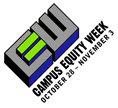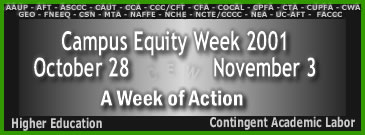|
Report
Concludes Universities Rely on Lecturers
Lower
Pay, Shorter Contracts For Non-Tenure Professors
By ERIC OSTREM
Daily Cal Staff Writer
Thursday, October 25, 2001
SAN FRANCISCO˛Universities across the nation, including UC, rely
heavily on nontenure-track professors and lecturers who are underpaid
and overused, according to a report released Wednesday at a press
conference at San Francisco Community College.
Nontenure-track professors and lecturers are given short-term, frequently
renewed contracts that offer less job security and less pay than
the long-term contracts given to tenured professors, according to
the report prepared by the American Federation of Teachers.
These teachers are "overused and abused" to such "epidemic
proportions" that UC faces a problem attracting and retaining
high-quality faculty, said Fred Glass, spokesperson for the teachers'
federation.
According to the report, it is a trend that directly threatens the
quality of undergraduate education.
"The university is devaluing education, especially undergraduate,"
said UC Santa Cruz professor Jeremy Elkins, president of the UC-American
Federation of Teachers. "(UC) doesn't say that out loud, but
the policies they enact say that every day."
More than 50 percent of UC Berkeley undergraduate courses are taught
by non-tenured lecturers, who are often underpaid and overworked,
said Michael Eisenscher, director of organizational development
for the UC-American Federation of Teachers.
Lecturers who have not taught for six years at UC are only offered
one-year contracts, Eisenscher said. Once they have worked here
for six years, they are offered three-year contracts˛if they are
hired again.
But often some departments do not keep lecturers for six years,
he said.
"It creates this kind of permanent churning in the work force.
It's designed to turn people over. They don't say that, but that's
the effect," Eisenscher said. "This administration is
feudal in its attitude toward employees."
The percentage of university instructors nationwide who are tenure-tracked
has declined, according to data from the U.S. Department of Education.
"People can teach for decades and not be offered a tenured
position," Elkins said. "They're sort of treated as though
they're guest workers."
UC lecturers, most of whom have the same qualifications as professors,
face poor working conditions, Elkins said, such as the short-term
contracts that make it difficult to get loans and offer little job
security.
They are also given little or no opportunity to offer input into
policy and governance and are not members of the Academic Senate,
which creates education policy.
"Over the last 10 years, the number (of lecturers at UC Berkeley)
has escalated pretty dramatically," Eisenscher said. The UC-American
Federation of Teachers represents around 525 non-Academic-Senate
faculty at UC Berkeley, most of whom are lecturers, he said. The
federation also represents librarians and academic coordinators.
The International Area Studies department at UC Berkeley is staffed
entirely by lecturers, said Jerry Sanders, who has been a peace
and conflict studies lecturer for 13 years.
"We do about one-third more teaching (than tenured professors)
and get about one-third less pay," Sanders said.
Tenured professors are paid to teach and also research, but lecturers
with the same credentials have no opportunity for sabbaticals, and
are not paid for the research and publishing they are often required
to do, Elkins said.
"UC lecturers play a vital role in helping the university fulfill
several aspects of its instructional mandate," UC Office of
the President spokesperson Paul Schwartz said by e-mail.
(c) 2001
Berkeley, California
E-mail: dailycal@dailycal.org.
|


